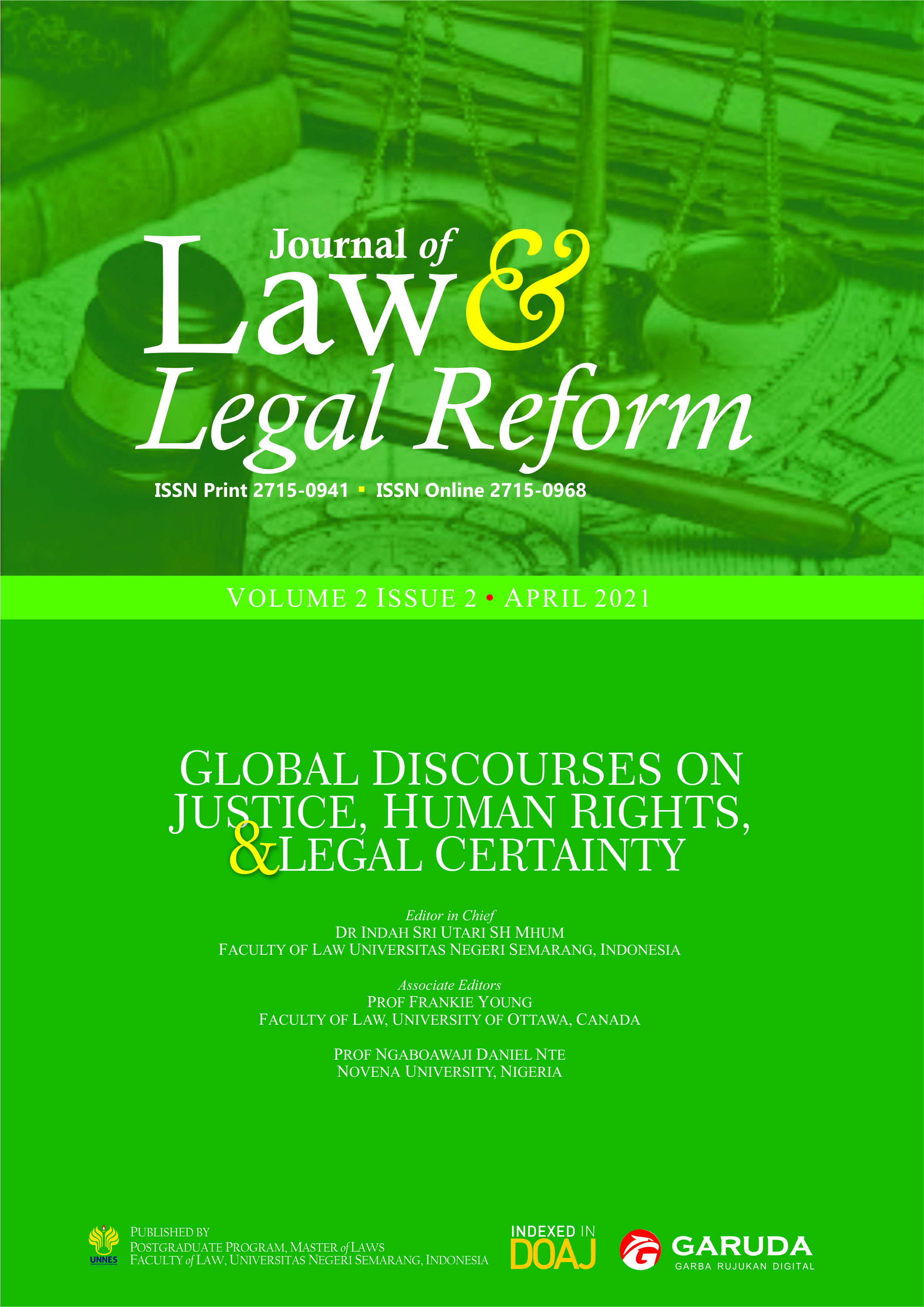A Discourse of Chemical Castration Punishment: How We Protect Our Children from the Rapist?
Main Article Content
Abstract
The crime of rape against children is a serious problem that must be resolved by the government. The increase in cases of rape against children proves that the existing regulations have not provided a deterrent effect for the perpetrators. The state here has a role in dealing with victims of rape, the role of the state can be realized through the rehabilitation process as a step to restore the psychological condition of victims as a result of crimes that have occurred. In addition to rehabilitation, the state also issued regulations to prevent these crimes from recurring by issuing Law Number 17 of 2016. Several questions arise from the author that the issuance of this law can fulfil the rights of children as victims of rape and be able to prevent the crime of rape from recurring. The research indicated that the existence of Law Number 17 of 2016 does not guarantee protection for child victims of rape. The law focuses on the punishment of perpetrators not on the rehabilitation process that should be carried out by the state and the rights of children who are victims of rape have not been fulfilled.
Article Details
All writings published in this journal are personal views of the authors and do not represent the views of this journal and the author's affiliated institutions. Author(s) retain copyrights under a Creative Commons Attribution-NonCommercial-ShareAlike 4.0 International (CC BY-NC-SA 4.0).
References
Arif, G. (2009). Masalah Perlindungan Anak. Bandung: Mandar Maju.
Djamil, M. N. (2013). Anak Bukan Untuk Dihukum (Catatan Pembahasan UU Sistem Peradilan Pidana Anak (UU-SPPA). Jakarta: Sinar Grafika.
Hasanah, N. H., & Soponyono, E. (2018). Kebijakan Hukum Pidana Sanksi Kebiri Kimia dalam Perspektif HAM dan Hukum Pidana Indonesia. Jurnal Magister Hukum Udayana (Udayana Master Law Journal), 7(3), 305-317.
Krismiyarsi, K. (2018). Study of Penal Policy on Chemical Castration Sanction on Child Sexual Crimes Cases in Indonesia. IJCLS (Indonesian Journal of Criminal Law Studies), 3(2), 121-132.
Mardiya, N. Q. A. (2017). Penerapan Hukuman Kebiri Kimia Bagi Pelaku Kekerasan Seksual. Jurnal Konstitusi, 14(1), 213-233.
Marlina, M. (2012). Peradilan Pidana Anak di Indonesia: Pengembangan Konsep Diversi dan Restorative Justice. Bandung: Refika Aditama.
Moleong, L. J. (2004). Metode Penelitian Kualitatif. Bandung: Remaja Rosdakarya.
Mukhti, F., & Yulianto, A. (2010). Dualisme Penelitian Hukum Normatif dan Empiris. Yogyakarta: Pustaka Pelajar.
Nashriana, N. (2012). Perlindungan Hukum Pidana Bagi Anak di Indonesia. Jakarta: Rajawali Press.
Nour, A. (2020). Chemical Castration of the Sexual Offender versus Human Fundamental Rights and Freedoms. Scholars International Journal of Law, Crime and Justice. Dubai: Scholars Middle East Publisher, 3(5), 144.
Puteri, D. S., Wahono, D. C., Firdaus, R. J., & Sukamdani, S. (2020). Chemical Castration from Criminal Law and Human Rights. Cepalo, 4(1), 67-80.
Rachman, M. (1993). Strategi dan Langkah Penelitian. Semarang: IKIP Semarang Press.
Rahardjo, S. (2010). Penegakan Hukum Prograsif. Jakarta: Kompas.
Ratkoceri, V. (2017). Chemical Castration of Child Molesters–Right or Wrong?!. European Journal of Social Science Education and Research, 4(5), 70-76.
Saleh, R. (1983). Perbuatan Pidana dan Pertanggungjawaban. Jakarta: Rineka Cipta.
Shidarta, D. D. (2006). Pokok-Pokok Filsafat Hukum: Apa dan Bagaimana Filsafat Hukum Indonesia. Jakarta: Gramedia Pustaka Utama.
Solehudin, M. (2003). Sistem Sanksi dalam Hukum Pidana. Jakarta: Raja Grafindo Persada.
Susanto, I.S. 2011. Kriminologi. Yogyakarta: Genta Publishing.
Tunggal, S., & Naibaho, N. (2020). Penjatuhan Kebiri Kimia Bagi Pelaku Kejahatan Seksual Terhadap Anak Dalam Perspektif Falsafah Pemidanaan. Jurnal Hukum & Pembangunan, 50(2), 329-343.
Utari, I. S. (2012). Aliran dan Teori dalam Kriminologi. Yogyakarta: Thafa Media.
Windari, R., & Syahputra, A. (2020). Menakar Aspek Kemanfaatan dan Keadilan Pada Sanksi Kebiri Kimia Terhadap Pelaku Kekerasan Seksual Anak Di Indonesia. Soumatera Law Review, 3(2), 247-264.
Zhuang, J. (2018). Chemical castration: international experience and Chinese path to control pedophilia crimes. Advances in Applied Sociology, 8(08), 575.
